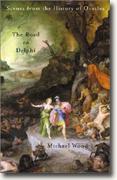The Road to Delphi
Michael Wood
book reviews:
· general fiction
· chick lit/romance
· sci-fi/fantasy
· graphic novels
· nonfiction
· audio books
· author interviews
· children's books @
curledupkids.com
· DVD reviews @
curledupdvd.com
newsletter
win books
buy online
links
home
for authors
& publishers
for reviewers

 |
The Road to Delphi: Scenes from the History of Oracles Michael Wood Farrar, Straus & Giroux Hardcover 320 pages August 2003 |
|
Michael Wood, author and professor of English, is a clever fellow. When I picked up this book I had no idea where it could lead, to Delphi, or far beyond. It goes just about everywhere, with humor, intellect and prodigious feats of literary mix and match.
Wood delves into the mystery of memory: do we remember the past as it happened, or do we alter it subtly to fit the future, and thereby attribute to ourselves or others a prescience that was never intended, or never existed? It's a great question, but few people could have written a book about it because it's so slippery as to elude the grasp of all but the most determined. Reading The Road to Delphi is like trying to work a complex brainteaser - sometimes you just get tired of trying to understand it. Then you just read on. Woods writes, in reference to the proposition that "Greek gods are powers, not persons," "Things are not either fixed or not fixed, they are both. But the views are both not true at the same time, and once Zeus has taken on the very different forms of knowledge of Themis and Metis, mere humans can never know which aspect he will show at any given time, which card he will choose to play."Even Wood must exuberantly refer to this as "sleight of narrative." Regarding newspaper astrology, Wood takes us on another little ride - the astrology dealt out in daily columns first reflects reality, then distorts it, then confirms it by its very distortion. We are told we must be happy, which is sensible, but as we imagine that we are happy in order to "follow" our horoscope, we confirm the prediction that we will be happy. Wood declares, in a Wood-ian ecstasy: "I read horoscopes now because I love the ruses of rhetoric on display in them, the disciplined appearances of saying something when saying nothing much, or perhaps nothing at all." Wood asserts that oracle-stories are almost true, and we can make them true through our actions - by affecting the future to affirm the prediction; or through memory alteration, adjusting the past to make it seem to have been an accurate prognosis of future events. In ancient societies, when lines between human and superhuman were more blurred and animistic, the character of the sybil was a useful projection. She served as that piece of our mentation that allows us to think we think. Using her predictions, baleful as they usually seemed to be, we could order our lives in a framework almost rational, but still connected to prethought, the unquestioned belief that the future can be foretold, that the gods can be consulted and will answer our prayers, however trivial. Literature, and the archetype of folk memory is full of people who either did or didn't "listen" to their oracle. Oedipus, for heaven's sake - he kept trying to jump between accepting and bewailing his fate, accepting and indulging in his fate, and refusing to accept his fate and trying bravely to act as though he had no predestiny. Macbeth was in a similar dilemma: if he blindly and merrily believed the witches, he would be a happy man - or so he thought he thought. But, in the end, the Fates always win. They can do so by stretching their truth, coming up with a catch that makes the prophecy come out right. Macbeth was defeated by a man not born of woman -- how can this be? Well, he didn't figure on being defeated by a guy who from his mother's womb had been untimely ripped -- but such was the twist to the witches words that allowed them to come out on top. Wood has dished up a banquet for thought. The read is fun and fast-paced, and highly recommended.
|
|
|
|
 Click here to learn more about this month's sponsor! |
|
| fiction · sf/f · comic books · nonfiction · audio newsletter · free book contest · buy books online review index · links · · authors & publishers reviewers |
|
| site by ELBO Computing Resources, Inc. | |
 Let's assume you know very little about oracles. Therefore you, like me,
will be expecting a treatise on Greek thought and religion. We are quickly
steered away from that limited field to a much wider vista. Let's suppose that an oracle might mean any being or mechanism that a person
consults, from whom or which he expects an answer that can be used a guide
for future action and contemplation. Wow! Suddenly we're in a whole 'nother
place. From here we can go almost anywhere -- to pop astrology, to
Shakespeare, to the movies.
Let's assume you know very little about oracles. Therefore you, like me,
will be expecting a treatise on Greek thought and religion. We are quickly
steered away from that limited field to a much wider vista. Let's suppose that an oracle might mean any being or mechanism that a person
consults, from whom or which he expects an answer that can be used a guide
for future action and contemplation. Wow! Suddenly we're in a whole 'nother
place. From here we can go almost anywhere -- to pop astrology, to
Shakespeare, to the movies.